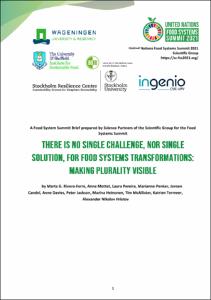There is No Single Challenge, Nor Single Solution, for Food Systems Transformations: Making plurality visibleA Food System Summit Brief prepared by Science Partners of the Scientific Group for the Food Systems Summit

There is No Single Challenge, Nor Single Solution, for Food Systems Transformations: Making plurality visible
A Food System Summit Brief prepared by Science Partners of the Scientific Group for the Food Systems Summit

| dc.contributor.author | Rivera-Ferre, Marta G. | |
| dc.contributor.author | Mottet, Anne | |
| dc.contributor.author | Pereira, Laura | |
| dc.contributor.author | Penker, Marianne | |
| dc.contributor.author | Candel, Jeroen | |
| dc.contributor.author | Davies, Anne | |
| dc.contributor.author | Jackson, Peter | |
| dc.contributor.author | Heinonen, Marina | |
| dc.contributor.author | McAllister, Tim | |
| dc.contributor.author | Termeer, Katrien | |
| dc.contributor.author | Hristov, Alexander Nikolov | |
| dc.date.accessioned | 2021-08-10T15:05:21Z | |
| dc.date.available | 2021-08-10T15:05:21Z | |
| dc.date.issued | 08.2021 | |
| dc.identifier.uri | https://hdl.handle.net/20.500.11811/9268 | |
| dc.description.abstract | There is a growing call (and agreement) to transform food systems towards sustainable, just and healthy systems, understanding that transformation is about fundamental, system- wide changes, beyond piecemeal interventions (see Box 1 for the new FACCE-JPI approach to food systems). But, what does transformation look like? Is there a consensus about what we want to transform in food systems, who will do it and how? The objective of this policy brief is to call for fairer, more inclusive and eventually, more effective decisions on food systems transformations. For doing so, it focuses on decision-making under uncertainty, highlighting complexity and framings as two components of this: On one hand complexity requires us to avoid oversimplification of messages (see the livestock section) and on the other, framing calls for the integration of a plurality of values and worldviews (see the governance section). Thus, in the context of the UNFSS objective of transforming food systems, this brief aims to raise awareness of decision makers about the need of developing and using knowledge and tools that i) tackle the complexity of food systems as complex social-ecological systems, and ii) recognise the existence of different framing and values in a context of uncertainty. We also reflect on the role of science in this process. While our focus is global, we focus on Europe to exemplify our arguments. Yet, transformation cannot happen in one world region independently from the others. A global movement requires first adopters to start the process. | en |
| dc.format.extent | 12 | |
| dc.language.iso | eng | |
| dc.rights | In Copyright | |
| dc.rights.uri | http://rightsstatements.org/vocab/InC/1.0/ | |
| dc.subject | Food systems Transformations | |
| dc.subject | Livestock | |
| dc.subject | Science | |
| dc.subject | Governance | |
| dc.subject.ddc | 630 Landwirtschaft, Veterinärmedizin | |
| dc.title | There is No Single Challenge, Nor Single Solution, for Food Systems Transformations: Making plurality visible | |
| dc.title.alternative | A Food System Summit Brief prepared by Science Partners of the Scientific Group for the Food Systems Summit | |
| dc.type | Arbeitspapier | |
| dc.identifier.doi | https://doi.org/10.48565/scfss2021 | |
| dc.publisher.name | Center for Development Research (ZEF) in cooperation with the Scientific Group for the UN Food System Summit 2021 | |
| dc.publisher.location | Bonn | |
| dc.rights.accessRights | openAccess | |
| dc.relation.url | https://sc-fss2021.org/wp-content/uploads/2021/08/Making-plurality-visible.pdf | |
| ulbbn.pubtype | Zweitveröffentlichung | |
| dc.version | updatedVersion |
Dateien zu dieser Ressource
Das Dokument erscheint in:
-
FSS Briefs by Partners of Scientific Group (41)
"Food Systems Summit Briefs" are invited papers by the Scientific Group in support of the Summit agenda setting.




